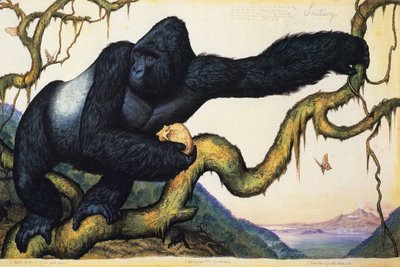Walton Ford: Aping Colonialism...

It's time to reassert that Walton Ford is one of my heroes. His work blends so many things I’m interested in – the subversion of old art techniques, obscure animal behaviors, black humor, political satire, historical allegory, anthropomorphization, family history, visionary cartooning, and the brutality of beautiful things. There’s so much mesmerizing complexity in his work, and always that faint whiff of repulsion and rotting flesh beneath the magnificent plumage and pelts... I'm wildly jealous of his talent.
As a descendant of white, southern slave owners, Ford wrestles with the ethics and mindsets of the colonial world in all his work. "I was born in 1960. There was the great kind of southern gentleman, naturalist sportsman tradition in my family that was still being kind of held onto in spite of the fact that most of family's wealth was, of course, gone with the wind...thank god," he says.
"My work resembles the kinds of notebooks that these colonial guys kept. They did sketches of the local fauna and flora, and named things after themselves and their own friends and colleagues back in England. It wouldn’t matter that the thing they 'discovered' might be known for thousands of years in the local culture. These guys went ahead and called it "Johnson’s this" or "So and So’s that" and gave it a Latin name and filed it away."
"Take a figure like Audubon, who was kind of a madman. He was violent. If he didn’t like you he might challenge you to a duel or something. I mean the guy was completely out of control and shooting birds off the deck of ships and watching them drop in the ocean. On a riverboat trip down the Missouri he’d shoot a coyote and wound it and it would run off into the hills and he’d never see it again. He wasn’t the enlightened sportsman that we’re used to thinking about. Often when I paint something in his style, I try to think that it’s almost like his dream state or something. It’s like the way he really thought somehow betraying itself and leaking into the work, infecting it somehow, giving it a computer virus and making it do what it oughtn’t do. Or what it shouldn’t reveal."
"So I use those modes of representation to paint this other stuff. That turns that tradition a little bit on its head. Rather than in the service of these great collections or empires, it tells an alternative narrative. I try to bring it up to date and think about how it affects the way we think today and how similar the 19th Century is to now. That moment of empire is almost the same. That moment of fear and first contact and misunderstanding and misapprehension is exactly what we’re going through right now. And we haven’t seemed to figure anything more or less out since then. You still feel like you would be 'carefully shot and carelessly buried' if you made the wrong move."
"All of this makes it sound like I have this great intellectual reason for making these things, but ultimately I want to paint a sexy monkey, and I want to paint a big, huge elephant with an erection. And there’s this other sort of silly kind of underground comic aspect to me that just wants to paint this stuff."
Must read interview with Walton Ford, plus more clips and images, here.

0 Comments:
Post a Comment
<< Home